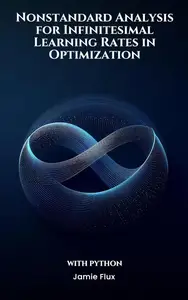Nonstandard Analysis for Infinitesimal Learning Rates in Optimization With Python

Free Download Nonstandard Analysis for Infinitesimal Learning Rates in Optimization With Python by Jamie Flux
English | October 20, 2024 | ISBN: N/A | ASIN: B0DKF4RKRK | 190 pages | PDF | 3.90 Mb
Unlock the power of infinitesimally small learning rates to drastically improve your optimization algorithms.
This comprehensive guide delves into the frontier between nonstandard analysis and optimization, providing both the theoretical underpinnings and practical applications of hyperreal numbers in modern computational challenges.
Key Features:
* Understand the foundational principles of nonstandard analysis and the hyperreal number system.
* Explore the use of ultrafilters and ultraproducts for hyperreal number construction.
* Master the transfer principle to bridge standard and nonstandard mathematical structures.
* Delve into advanced topological concepts within the nonstandard framework.
* Integrate nonstandard analysis into both first-order and second-order optimization methods.
* Leverage infinitesimal learning rates to boost convergence in machine learning algorithms.
* Gain hands-on experience with Python code implementations for each concept and algorithm.
Description:
With the unprecedented growth in data and computational power, the need for sophisticated optimization techniques is more crucial than ever. This book pioneers the use of nonstandard analysis and hyperreal numbers to take optimization to new heights. Discover how employing infinitesimal learning rates can enhance the accuracy and efficiency of optimization algorithms, from gradient descent to complex stochastic methods. Whether you’re a researcher, practitioner, or a student in mathematical optimization, this book provides you with both the theoretical insights and practical tools necessary to push boundaries.
What You Will Learn:
* Grasp the axiomatic frameworks underpinning nonstandard analysis.
* Construct hyperreal numbers using ultrafilters and ultraproducts.
* Apply the transfer principle for coherent transitions between standard and nonstandard structures.
* Investigate the properties of infinitesimals and infinite numbers in the hyperreal framework.
* Navigate topological concepts in nonstandard analysis, including sets and convergence.
* Establish the foundations of differential calculus using infinitesimals.
* Conduct integral calculus with hyperreal numbers, embracing Riemann and Lebesgue integrals.
* Explore nonstandard measure theory and internal measures.
* Tackle hyperfinite sets and nonstandard functional analysis.
* Evaluate traditional optimization methods like gradient descent and Newton’s method.
* Analyze issues surrounding learning rates in optimization.
* Address limitations of conventional learning rates with nonstandard solutions.
* Formulate and implement infinitesimal learning rates for refined algorithms.
* Develop hyperreal gradient descent techniques for superior performance.
* Examine convergence properties enhanced by infinitesimals.
* Extend infinitesimal concepts to stochastic optimization, including SGD.
* Apply hyperfinite discretizations for iterative processes.
* Enhance momentum-based methods with nonstandard analysis.
* Innovate adaptive learning rate strategies employing infinitesimals.
* Integrate nonstandard analysis into Newton’s and quasi-Newton methods.
* Navigate the complexities of nonconvex optimization with new strategies.
* Implement hyperreal line search and trust region methods.
* Use infinitesimal perturbations in sensitivity analysis.
* Create robust regularization techniques to combat overfitting.
* Adapt infinitesimal methods to parallel and distributed frameworks.
* Integrate nonstandard analysis with automatic differentiation.

